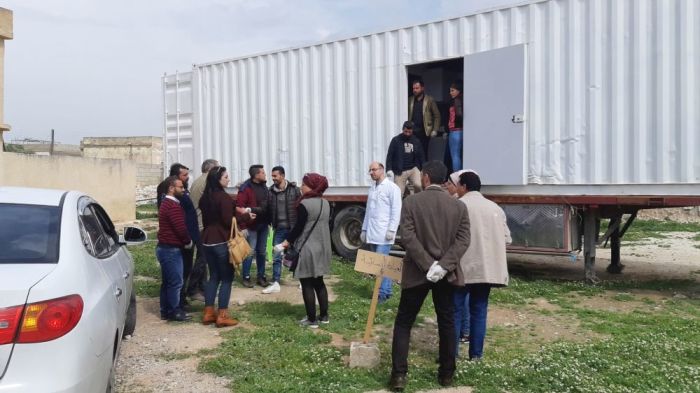Christian NGO to deploy 'hospitainer' in Syria with donation from Glennon Doyle's charity

A Michigan-based Christian humanitarian organization is partnering with a charity led by bestselling author Glennon Doyle to deploy a “hospitainer” that will treat thousands stuck in the crossfire of the Syrian civil war.
Partners Relief & Development, a nonprofit that serves in a handful of conflicts worldwide, is gearing up to deploy a mobile medical clinic that will serve hundreds of people per day outside of Idlib, the last urban area under opposition control in Syria.
Fighting in Idlib in recent months has further displaced nearly 1 million civilians suffering from a decade-long civil war.
The clinic will be backed by an initial grant of $66,505 from Together Rising, an organization run by Doyle, who is in a same-sex marriage with soccer star Abby Wambach and is the creator of the online community Momastery. Together Rising is responsible for raising millions for humanitarian causes through what it calls “Love Flash Mobs.”
To date, Together Rising and its donors have given over $5 million to provide life-saving aid to besieged people in Syria over the course of several years.
“I didn't know about Together Rising until they reached out to us and said that since November they've been researching us and they saw what we're doing and asked what the need was,” Partners Relief & Development President Steve Gumaer told The Christian Post.
“And they agreed to fund the first month of operation for the hospital. So for Together Rising, I guess this is kind of seeing how the relationship goes and they'll assess after that.”
Gumaer told CP that Partners Relief & Development has enough funding to keep the hospitainer operating for three months.
“It's pretty hard work to find people that are resourceful and have that kind of a social following and who are that generous right out of the gate,” Gumaer explained.
The clinic is a converted mobile semi-truck that operates as a full-service mini-hospital to provide life-saving aid to families fleeing from the crisis in Idlib.
According to Together Rising, the funding will employ 43 full-time displaced doctors and nurses who've worked in hospitals and clinics across the war-torn country. Some of those hospitals have been damaged or shut down as a result of the conflict.
Partners Relief & Development is still working with the Syrian Ministry of Health to get approval for the hospital to be in a location that is as close as 20 kilometers south of the front line of the fighting.
Gumaer said that two weeks of “red tape” have held up the process of getting the hospitainer in place.
“We’ve been going back and forth with the Ministry of Health in Syria to get this thing on the road,” he said. “Hopefully, by the end of today, we'll have an answer. And if we can't deploy it up there immediately, we're going to get it as close as we can without approval and start helping displaced families.”
There will be two rotations of full medical staff ready once the hospitainer is in place.
“Once it's in place, it'll have the capacity to treat up to 1,000 people a day depending on their ailments,” Gumaer said. “The medical staff will work in two shifts, so it'll be 24/7 for the time being.”
The hospitainer will provide general internal medicine, pediatric care, digestive care, dermatological care as well as counseling and awareness sessions. It will be fully stocked with enough medicine for about one month.
The clinic has a birthing room, ultrasound, X-ray machine and is a sterilized environment.
Since one of the doctors who will serve at the hospitainer is a surgeon, it will have minor surgery capabilities.
“The reason it can do up to 1,000 people a day is because most ailments don't require that kind of intensity,” Gumaer said. “They're just [giving] antibiotics or antifungals or treating minor problems that can become big if they're not treated.”
Partners Relief & Development joined in an effort last year to operate the same hospitainer in Hama, Syria, for several months. In Hama, the hospitainer treated over 27,000 people.
The organization paid to have the hospitainer outfitted and funded the first three months of operating costs.
Gumaer said that since the healthcare system has been “torpedoed” in Syria, medical clinics like the hospitainer become a “primary health care mechanism” for many people.
“It's one of the most impressive and expensive things we've ever done,” he said. “Once it gets to where people are needed, it is an effective machine.”
An ambulance also travels with the hospitainer. The ambulance drives around the surrounding area to pick people up and bring them to the hospitainer for treatment.
A big area of concern for the organization, as well as many across the globe, is the spread of coronavirus.
“Syria isn’t admitting that they have any coronavirus yet,” Gumaer said. “But the northeast part of the country has verified it. What we've understood is [the World Health Organization] has permission to diagnose and help people by screening them and sending those screenings to Damascus for testing.”
According to Gumaer, the government is taking measures to isolate, such as closing schools and restaurants and public services.
“It appears that they are recognizing now that they have a coronavirus problem. But they are not doing anything in the health sector about it yet as far as we can tell. Our biggest concern is that the doctors and staff members on board have what they need both in terms of knowledge and supplies and method of directing people who have contracted the virus to self-quarantine and somehow survive in the diminished state these people live in.”
He fears that the coronavirus can kill far more people in a setting like Syria where health responses are diminished.
“And as soon as we get permission from the Ministry of Health to include [coronavirus testing] as a service on board, then we're already working on a game plan to address that new challenge,” he said.
Follow Samuel Smith on Twitter: @IamSamSmith
or Facebook: SamuelSmithCP




























